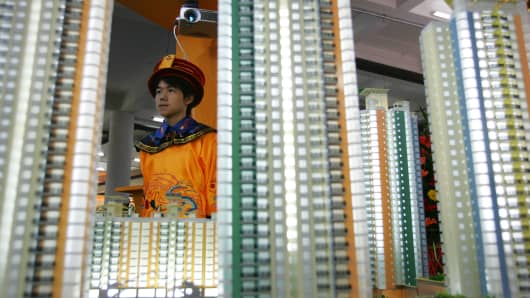China's new home prices rose in March from a year ago, a third consecutive month, as home buyers rushed to finalize deals to avoid a new capital gains tax, which is expected to help slow increases in coming months as the government looks to crack down on speculation.
Relentlessly rising prices, combined with strong property sales, highlight the challenges facing Chinese policymakers as they struggle to curb house price inflation and still support economic growth.
Average new home prices across China climbed 3.6 percent last month, after a year-on-year increase of 2.1 percent in February, according to Reuters calculations from data released by the National Bureau of Statistics (NBS) on Thursday.
Property inflation will likely ease this month after a flurry of government steps to discourage speculative buying, according to Liu Jianwei, a senior statistician at the NBS.
(Read More: China Hosing Curbs Kick In, So Why Are Stocks Up?)
"Home demand surged intensively in advance as prospective home buyers rushed to buy homes and developers have cut or scrapped discounts on new homes or even raised home prices", Liu said in a separate statement published on Thursday.
"With the government's property measures taking further effect, home prices in April are likely to stabilize," Liu said.
China's central government said on March 1 that it planned to introduce a 20 percent capital gains tax and higher down-payments and mortgage rates for second-time home buyers in cities where prices were deemed to be rising too fast.
China's major cities have unveiled strict property controls, including Beijing, which has raised minimum down-payments on second home purchases to 70 percent of valuations from 60 percent.
(Read More: Beijing, Shanghai Vow to Enforce New Property Cooling Measures)
On a monthly basis, new home prices rose 1.2 percent in March and have now risen for eight of the last nine months.
Home prices rose month-on-month in 68 of 70 major cities monitored by the NBS in March, up from 66 in February, the NBS data showed.
New home prices in Beijing rose 8.6 percent in March from a year earlier, compared with February's year-on-year increase of 5.9 percent. Shanghai's prices were up 6.4 percent in March on a year ago, versus 3.4 percent annual growth in February.
Initial Results
China's fight against property speculation in its third year. Home prices began their latest climb in mid-2012 when the central bank began to expand monetary easing as part of Beijing's growth-supporting policies.
Fresh property tightening measures had shown initial results in March when growth of property investment and sales cooled from levels in the first two months, Sheng Laiyun, a spokesman at the NBS, said on Monday.
(Read More: Are Asia's Property Markets Too Hot to Handle?)
Real estate investment expanded 20.2 percent on a year earlier in the first quarter of 2013, slower than an annual increase of 22.8 percent in January-February.
Revenues from property sales in March rose 46.5 percent from a year earlier, marking the second highest monthly gain since July 2011, though cooling from annual growth of 77.6 percent in the first two months.
Still, China's home prices face upward pressures as a credit boom in the first quarter could suggest new money is being channeled into the property sector.
Wang Zhaoxing, vice-chairman of the China Banking Regulatory Commission (CBRC), said China will strengthen supervision of property-related loans this year to combat potential risks to the banking sector though the quality of this sector's loans are generally stable.
"There is rising pressure from the risk of property loans and the potential risks could not be neglected," Wang was quoted as saying by the official Financial News on Thursday.
China's property developers have a relatively high debt ratio and more than a half of them still suffer from cash strains while mortgage defaults are rising.
"There have been increasing defaults on mortgage loans in some areas since the third quarter last year, especially for high-end expensive homes or big homes," Wang added.


